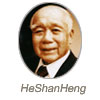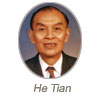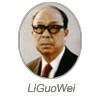| |
|
Professor Zhang Yaoxue obtained his Doctor degree in engineering from Tohoku University, Japan,in 1989. He joined Tsinghua University as a fulltime faculty in 1990. From then on, he has been leading a research group working on the computer networking area, and achieved a series of outstanding results.
He proposed a novel method to improve the reliability and to reduce logical errors of protocol software, which has been compiling into the book named “Advanced computers” in 1990 as socalled“Zhangs Synthesis Algorithm”.He has done a lot of work in the area of Active Services and Program Mining. He published many papers and also wrote a monograph on this topic. He also proposed a novel computing paradigm——the Transparence Computing, in which OS and other resources being stored on the server, no OS and application programs being installed on the clients, users can voluntarily choose OS and applications on the client from the server via network after it being powered on. He published over 150 papers in international journals or conferences.
He developed first network router product in China, and then further developed its advanced model which solved a series of key technical problems related to routers and won him the National Science & Technology Progress Award(2nd place) twice respectively in 1998 and 2001. In recent years, he leaded his research group to develope a transparence computer system based on the computing paradigm mentioned above, which has been widely applied through national informational construction.Because of his innovative research,Professor Zhang has been granted with National Technology Invention Awards(2nd place) in 2004.
As an administrator of MOE, Professor Zhang took charge of implementing the construction of national college Sci&Tech parks and modernized longdistance education, which promoted the industrialization of colleges hightech research results and development of network education. Under his supervision, various constructive strategies and policies of MOE are established; one example is the No.4 MOE statute that mandates professors to teach while doing their research work. He also made efforts to implement several key MOE projects including the reformation of teaching methods for English at college level in China, establishing superb and exemplary courses for universities at national level, promoting resource sharing among various higher education institutions, and the project to produce 10,000 new teaching material for higher education institutions. These projects substantially drove higher education institutions to provide better education.
|
|






